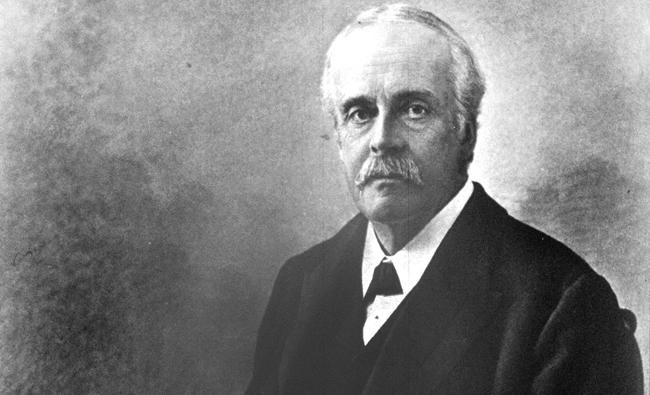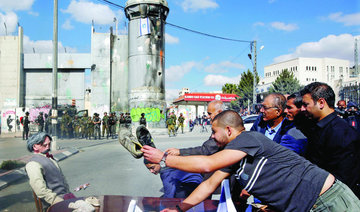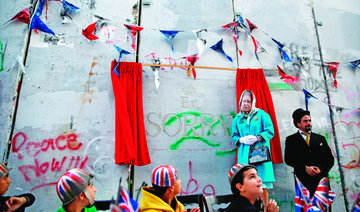LONDON: It was Arthur James Balfour’s hand that signed one of the most incendiary government letters documented in global history.
Today marks the 100th anniversary of the Balfour Declaration, when the British politician stated in a note to his colleague, Lord Rothschild: “His Majesty’s Government views with favor the establishment in Palestine of a national home for the Jewish people, and will use their best endeavors to facilitate the achievement of this object …”
The grave and protracted ramifications of this letter require little explanation. But what of the man behind the pen? Arthur James Balfour — or AJB, as he was known at the time of the declaration — was born in Scotland in July 1848 and served in the British government for 28 years, including a term as prime minister (1902-1905). It was during his four-year stint as foreign secretary (1916-1919) that Balfour penned the declaration. He died aged 81 in 1930.
As an intellectual and somewhat effete youth, Balfour was educated at Eton College and Cambridge University with a degree in moral sciences and only a dint of an interest in politics. According to journalists of the day, he viewed himself as a philosopher, but his elite familial connections soon saw Balfour climb the ladders of political power with ease.
“Lord Balfour was a statesman almost in spite of himself,” said the late politician’s New York Times obituary. “By inclination he was the philosopher… the thinker, the cultured gentleman of leisure, spending his life among the books and music he loved and knew so well.”
According to the New York Times: “In Cambridge they called him ‘Miss Nancy.’ When he first entered Parliament he was ‘Miss Balfour.’ His health was so delicate that it was a question whether he would not have to spend his winters in Egypt and forego any idea of a political career.”
Indeed, at the height of his career as Britain’s prime minister, Balfour himself said: “Give me my books, my golf clubs and my leisure, and I would ask for nothing more… If I could give up politics without disorganizing things or neglecting my duty, I would gladly do so.”
But vehement opponents such as the prominent author and journalist Harold Begbie claimed that Balfour was entirely at home in office. “Little as the general public may suspect it, the charming, gracious and cultured Mr. Balfour is the most egotistical of men, and a man who would make almost any sacrifice to remain in office,” spat Begbie in his book, “The Mirrors of Downing Street: Some Political Reflections.”
For a man whose words put into motion one of the world’s most contentious land occupations, Balfour’s political career began in earnest. In 1878 he became private secretary to his uncle, the Marquess of Salisbury, who was foreign secretary in the Conservative government headed by Benjamin Disraeli. In the 1885 general election, Balfour was elected to represent the East Manchester constituency.
According to Balfour’s official profile on the UK parliamentary website, it was thought that he was “merely entertaining himself” with politics: “Indeed the House did not take him quite seriously. Members looked upon him as just a young member of the governing classes who remained in the House because it was the proper thing for a man of family to do.”
However, later on Balfour joined the Cabinet as secretary for Scotland and then for Ireland under Lord Salisbury. Despite widespread doubt that he was up to the demanding job of Ireland secretary, Balfour proved to be a tough incumbent, restoring the rule of law. His land development legislation was considered well judged and has been credited with calming the Irish conflict for a generation.
Balfour eventually replaced his uncle as prime minister in 1902. The New York Times lamented: “Although (Balfour) was intimately connected with British politics for over half a century, he always gave the impression of a man who had withdrawn within himself.
“To most of the British people he was an abstraction, a paradox, an enigma that they could not solve. When they heard him speak it was only to feel more deeply puzzled.”
Balfour’s obituary claimed that his mind was that of a “subtle, analytical thinker meeting each new problem as a trained logician dealing with abstract ideas, not with people.”
Balfour was also famous for his supercilious attitude. Begbie, in his book, criticized Balfour for his manner and self-obsession. “This ‘Balfourian manner,’ as I understand it, has its roots in an attitude of mind — an attitude of convinced superiority which insists in the first place on complete detachment from the enthusiasms of the human race, and in the second place on keeping the vulgar world at arm’s length,” he wrote.
Bernard Regan, author of “The Balfour Declaration,” which is due to be published today, remarked that the accusations of Balfour’s haughty character come as “no surprise.”
Regan told Arab News: “There was a general attitude of that time in Parliament of imperial arrogance and racial superiority. It was thought that western Europeans were at the top and Jews were a part of that, while indigenous people like Arabs were looked down upon.”
Balfour famously said of himself: “I am more or less happy when being praised, not very comfortable when being abused, but I have moments of uneasiness when being explained.”
Who was Arthur James Balfour?
Who was Arthur James Balfour?

Iraq’s water reserves lowest in 80 years: official

- Iraqi spokesperson of the Water Resources Ministry Khaled Shamal says the country hasn't seen such a low reserve in 80 years
- Iraq is considered by the United Nations to be one of the five most impacted countries by climate change
BAGHDAD: Iraq’s water reserves are at their lowest in 80 years after a dry rainy season, a government official said Sunday, as its share from the Tigris and Euphrates rivers shrinks.
Water is a major issue in the country of 46 million people undergoing a serious environmental crisis because of climate change, drought, rising temperatures and declining rainfall.
Authorities also blame upstream dams built in neighboring Iran and Turkiye for dramatically lowering the flow of the once-mighty Tigris and Euphrates, which have irrigated Iraq for millennia.
“The summer season should begin with at least 18 billion cubic meters... yet we only have about 10 billion cubic meters,” water resources ministry spokesperson Khaled Shamal told AFP.
“Last year our strategic reserves were better. It was double what we have now,” Shamal said.
“We haven’t seen such a low reserve in 80 years,” he added, saying this was mostly due to the reduced flow from the two rivers.
Iraq currently receives less than 40 percent of its share from the Tigris and Euphrates, according to Shamal.
He said sparse rainfall this winter and low water levels from melting snow has worsened the situation in Iraq, considered by the United Nations to be one of the five countries most vulnerable to some impacts of climate change.
Water shortages have forced many farmers in Iraq to abandon the land, and authorities have drastically reduced farming activity to ensure sufficient supplies of drinking water.
Agricultural planning in Iraq always depends on water, and this year it aims to preserve “green spaces and productive areas” amounting to more than 1.5 million Iraqi dunams (375,000 hectares), said Shamal.
Last year, authorities allowed farmers to cultivate 2.5 million dunams of corn, rice, and orchards, according to the water ministry.
Water has been a source of tension between Iraq and Turkiye, which has urged Baghdad to adopt efficient water management plans.
In 2024, Iraq and Turkiye signed a 10-year “framework agreement,” mostly to invest in projects to ensure better water resources management.
Israeli strikes kill 23 in Gaza, including a journalist and rescue service official

- Israeli fire kills at least 23 people in Gaza
- Israel controls 77 percent of Gaza Strip, Hamas media office says
CAIRO: Israeli military strikes killed at least 23 Palestinians across the Gaza Strip on Sunday, including a local journalist and a senior rescue service official, local health authorities said.
The latest deaths in the Israeli campaign resulted from separate Israeli strikes in Khan Younis in the south, Jabalia in the north and Nuseirat in the central Gaza Strip, medics said.
In Jabalia, they said local journalist Hassan Majdi Abu Warda and several family members were killed by an airstrike that hit his house earlier on Sunday.
Another airstrike in Nuseirat killed Ashraf Abu Nar, a senior official in the territory’s civil emergency service, and his wife in their house, medics added.
There was no immediate comment by the Israeli military.
The Hamas-run Gaza government media office said that Abu Warda’s death raised the number of Palestinian journalists killed in Gaza since October 7, 2023, to 220.
In a separate statement, the media office said Israeli forces were in control of 77 percent of the Gaza Strip, either through ground forces or evacuation orders and bombardment that keeps residents away from their homes.
The armed wing of Hamas and the Islamic Jihad said in separate statements on Sunday that fighters carried out several ambushes and attacks using bombs and anti-tank rockets against Israeli forces operating in several areas across Gaza.
On Friday the Israeli military said it had conducted more strikes in Gaza overnight, hitting 75 targets including weapons storage facilities and rocket launchers.
Israel launched an air and ground war in Gaza after Hamas militants’ cross-border attack on October 7, 2023, which killed 1,200 people by Israeli tallies with 251 hostages abducted into Gaza.
The conflict has killed more than 53,900 Palestinians, according to Gaza health authorities, and devastated the coastal strip. Aid groups say signs of severe malnutrition are widespread.
Israeli military says it intercepted missile from Yemen

- Yemen’s Iran-aligned Houthis have continued to fire missiles at Israel in what they say is solidarity with Palestinians in Gaza
CAIRO: The Israeli military said on Sunday that it had intercepted a missile launched from Yemen toward Israel.
Sirens sounded in several areas in the country, the Israeli military said earlier.
Since the start of the Israel-Hamas war in October 2023, Yemen’s Iran-aligned Houthis have continued to fire missiles at Israel in what they say is solidarity with Palestinians in Gaza.
Most of the group’s missile have been intercepted or have fallen short.
The Houthis did not immediately comment on the latest missile launch.
Syria to help locate missing Americans

DAMASCUS: Syria’s new authorities have agreed to help the United States locate and return Americans who went missing in the war-torn country, a US envoy said on Sunday.
“The new Syrian government has agreed to assist the USA in locating and returning USA citizens or their remains. The families of Austin Tice, Majd Kamalmaz, and Kayla Mueller must have closure,” US special envoy for Syria Tom Barrack wrote on X.
Turkiye, PKK must both change for peace: former militant

- For years, Yuksel Genc was a fighter with the Kurdish rebel group
- Genc herself joined the militants in 1995 when she was a 20-year-old university student in Istanbul
DIYARBAKIR, Turkiye: “When you try and explain peace to people, there is a very serious lack of trust,” said Yuksel Genc, a former fighter with the PKK, which recently ended its decades-long armed struggle against the Turkish state.
Talking over a glass of tea in a square in Diyarbakir, the biggest city in Turkiye’s Kurdish-dominated southeast, this 50-year-old former fighter with long auburn curls is worried about how the nascent rapprochement between Ankara and the Kurdistan Workers’ Party (PKK) will play out.
“The guerillas are sincere, but they don’t think the state is,” said Genc, her words briefly interrupted by the roar of a fighter jet flying overhead.
“They think the government does not trust them.”
For years, she was a fighter with the Kurdish rebel group, which on May 12 said it would disarm and disband, ending a four-decade armed struggle against the Turkish state that cost more than 40,000 lives.
The historic move came in response to an appeal by its jailed founder Abdullah Ocalan, arrested in 1999 and serving life in solitary ever since on a prison island near Istanbul.
Genc herself joined the militants in 1995 when she was a 20-year-old university student in Istanbul.
“At that time, many Kurdish villages were being burnt down, and we were constantly hearing about villages being evacuated, people being displaced and unsolved murders,” she said.
She described it as “a time of terrible repression.”
“You felt trapped, as if there was no other way than to join the guerrillas,” she said.
Four years later, after years in exile, Ocalan was snatched by Turkish commandos in a Hollywood-style operation in Nairobi.
“Ocalan’s capture provoked a deep sense of rage among the guerrillas, who feared it would mean the Kurdish cause would be destroyed,” she said.
But it was Ocalan himself who called for calm and insisted it was time for the Kurdish question to be resolved democratically. He urged his followers to go to Turkiye, hand over their weapons and seek dialogue.
“He thought our arrival would symbolize (the PKK’s) goodwill, and persuade the state to negotiate.”
Genc was part of the first so-called “groups for peace and a democratic solution” — a group of three women and five men who arrived in Turkiye on October 1, 1999 on what they knew would be a “sacrificial” mission.
After a long march through the mountains, they arrived in the southeastern village of Semdinli under the watchful eye of “thousands” of Turkish soldiers huddled behind rocks.
Handing over their weapons, they were transferred to the city of Van 200 kilometers (140 miles) to the north where they were arrested.
Genc spent the next nearly six years behind bars.
“For us, these peace groups were a mission,” she said. “The solution had to come through dialogue.”
After getting out, she continued to struggle for Kurdish rights, swapping her gun for a pen to become a journalist and researcher for the Sosyo Politik think tank.
Even so, her writing earned her another three-and-a-half years behind bars.
“Working for peace in Turkiye has a cost,” she said with a shrug.
When Recep Tayyip Erdogan became prime minister in 2003, there was hope for a new breakthrough. But several attempts to reach an agreement went nowhere — until now.
“Like in 1999, the PKK is moving toward a non-violent struggle,” she said.
“But laying down arms is not the end of the story. It is preparing to become a political organization.”
Resolving the decades-long conflict requires a change on both sides however, said Genc.
“It essentially involves a mutual transformation,” she argued.
“It is impossible for the state to stick with its old ways without transforming, while trying to resolve a problem as old and divisive as the Kurdish question.”
Despite the recent opening, Genc does not speak of hope.
“Life has taught us to be realistic: years of experience have generated an ocean of insecurity,” she said.
“(PKK fighters) have shown their courage by saying they will lay down their weapons without being defeated. But they haven’t seen any concrete results.”
So far, the government, which initiated the process last autumn, has not taken any steps nor made any promises, she pointed out.
“Why haven’t the sick prisoners been released? And those who have served their sentences — why aren’t they benefiting from the climate of peace?“
And Ocalan, she said, was still being held in solitary despite promises of a change in his situation.
The number of people jailed for being PKK members or close to the group has never been revealed by the Turkish authorities.
“The fact that Ocalan is still not in a position to be able to lead this process toward a democratic solution is a major drawback from the militants’ point of view,” she said.
“Even our daily life remains totally shaped by security constraints across the region with the presence of the army, the roadblocks — all that has to change.”




















